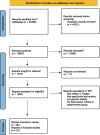Effects of mindfulness on test anxiety: a meta-analysis
- PMID: 38993347
- PMCID: PMC11238660
- DOI: 10.3389/fpsyg.2024.1401467
Effects of mindfulness on test anxiety: a meta-analysis
Abstract
Objective: This meta-analysis evaluated the effectiveness of mindfulness-based interventions (MBIs) on test anxiety across diverse age groups and intervention modalities.
Methods: Rigorous inclusion criteria were applied to select studies focusing on MBIs as the independent variable, with test anxiety as the outcome. A comprehensive search across multiple databases yielded 18 primary studies, contributing 20 comparisons. Data were extracted on study characteristics, sample sizes, and intervention details, and were analyzed using a random-effects model.
Results: The analyses incorporated 1,275 participants, with MBIs demonstrating a moderate to large negative effect on test anxiety (effect size = -0.716; 95% CI: -1.383 to -0.049). Moderation analysis indicated that mean age, number of sessions, and intervention delivery mode did not significantly influence effect sizes. Publication bias assessment suggested the presence of bias via Egger's regression (p = 0.025), though Begg and Mazumdar's test and Duval and Tweedie's trim and fill method indicated no missing studies.
Conclusion: MBIs are effective in reducing test anxiety, though results should be interpreted with caution due to potential publication bias and unexplained heterogeneity. The impact of MBIs did not vary significantly with participant age, number of sessions, or delivery mode.
Keywords: anxiety; meta-analysis; mindfulness-based interventions (MBIs); school environment; test anxiety.
Copyright © 2024 Yılmazer, Hamamci and Türk.
Conflict of interest statement
The authors declare that the research was conducted in the absence of any commercial or financial relationships that could be construed as a potential conflict of interest.
Figures
References
-
- Alrashdi D. H., Chen K. K., Meyer C., Gould R. L. (2024). A systematic review and meta-analysis of online mindfulness-based interventions for university students: an examination of psychological distress and well-being, and attrition rates. J. Technol. Behav. Sci. 9, 211–223. doi: 10.1007/s41347-023-00321-6 - DOI
-
- Bamber M. D., Morpeth E. (2019). Effects of mindfulness meditation on college student anxiety: a meta-analysis. Mindfulness 10, 203–214. doi: 10.1007/s12671-018-0965-5, PMID: - DOI
-
- Bishop S. R., Lau M., Shapiro S., et al. (2004). Mindfulness: a proposed operational definition. Clin. Psychol. Sci. Pract. 11, 230–241. doi: 10.1093/clipsy.bph077, PMID: - DOI
Publication types
LinkOut - more resources
Full Text Sources




